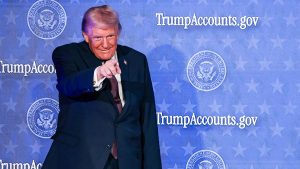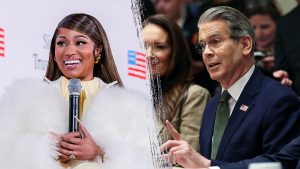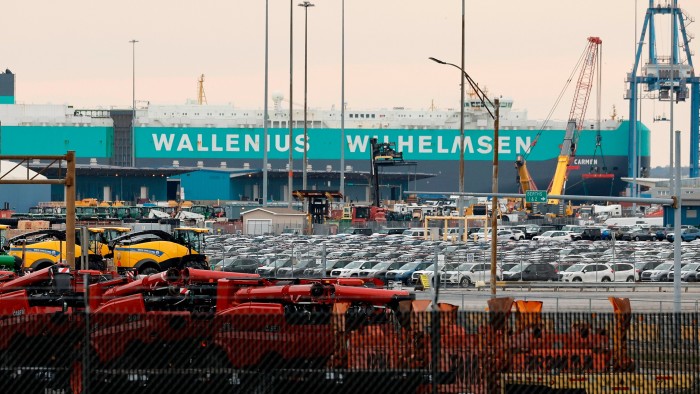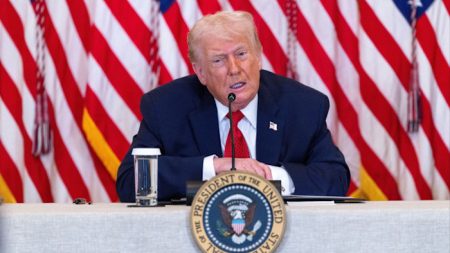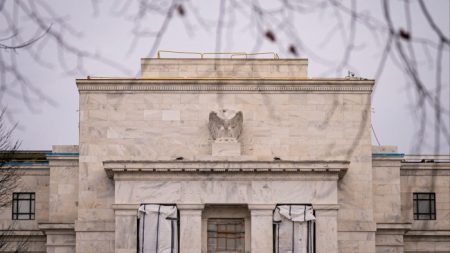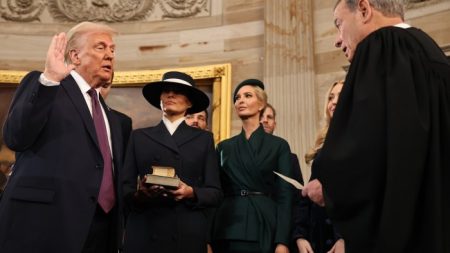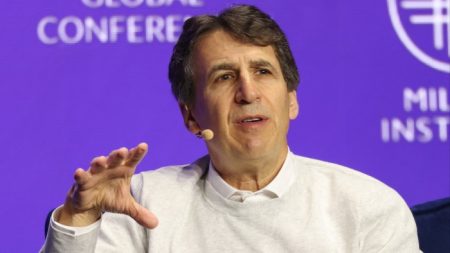Unlock the Editor’s Digest for free
Roula Khalaf, Editor of the FT, selects her favourite stories in this weekly newsletter.
European and Asian carmakers, already reeling from Donald Trump’s tariffs, face being saddled with steeper costs when shipping vehicles to the US, as Washington’s new port fee policy threatens to wreak havoc on the $150bn American seaborne car import market.
Having been ensnared in the shipping war between Washington and Beijing, car carrier operators will have to pay $150 for every vehicle they have capacity to carry into the US from October. That could equate to additional fees of about $1.8bn a year for the car carrier sector, according to Clarksons Research.
This comes after the US Trade Representative (USTR) in mid-April imposed a blanket fee on all non-US built vessels entering American ports, causing panic in the European, Japanese and South Korean shipping industries.
Lasse Kristoffersen, chief executive of the leading vehicle shipping line Wallenius Wilhelmsen, told the Financial Times the extra costs would end up with carmakers and other customers, and ultimately “the consumer will pay”.
“The uncertainty is so big that you stop making cars, you’re pausing decisions, you’re delaying exports and sourcing of parts,” Kristoffersen said.
The global seaborne car trade, which totalled roughly $600bn last year, involves a fleet of 836 specialised vessels. The new fee regime will cost as much as $1.2mn per US voyage for a large vessel, which the World Shipping Council says can transport 8,000 cars.
Many carmakers face 25 per cent tariffs on foreign-made vehicles imported into the US, and groups from Audi and Jaguar Land Rover to Aston Martin have halted vehicle shipments to the US because of the levies.
Mitsui OSK Lines, the world’s second-largest shipowner, said it was worried the new port policy in the US “might impact significantly on the global supply chain of the car industry”.
Andreas Enger, chief executive of Scandinavian car carrier operator Höegh Autoliners, in late April said the new costs would need to be shared by its customers. “It is an uncertainty both on the effect of the tariffs on our customers and the trade flows,” he said at the company’s latest earnings briefing.
Clarksons’ data for 2024 shows the car carrier industry moved a record 29mn vehicles, of which 4.6mn headed to the US.
US efforts to challenge Chinese supremacy in commercial shipbuilding began under Joe Biden’s administration, which opened an investigation in April last year into alleged unfair Chinese economic practices in shipbuilding and maritime logistics.
A bipartisan group of US lawmakers on Wednesday reintroduced the so-called “Ships for America Act” to reboot the US shipbuilding industry.
According to USTR, China’s shipbuilding market share has soared from virtually nothing in the 1990s to more than 50 per cent in 2023, while Chinese ownership of the global commercial fleet has risen to more than 19 per cent as of early 2025.
The new measures are aimed at boosting domestic manufacturing of ships but they were significantly watered down from an earlier proposal to impose fees of up to $1.5mn on ships built in China following warnings from US exporters of higher freight rates and ultimately higher prices for American consumers.
Car carrier operators were caught off-guard with new fees that target not just Chinese but all foreign-built vessels, with no exemptions for frequency of calls that were offered to other segments.
The new fees can be delayed for three years if operators order and take delivery of a car carrier built at a US yard during that period.
World Shipping Council CEO Joe Kramek said: “It’s not realistic. There are no yards in the US that can do it, and the shipbuilding capacity that is in the US is going to hold out for naval contracts because ultimately they’re more profitable.”
Only one vessel in the current global fleet of deep-sea car carriers was built in the US. About a fifth of the current car carrier capacity was built in China, while Japan accounted for 47 per cent. The US only accounted for 0.1 per cent.
Carmakers face a further problem as China accounts for 86 per cent of the new vessels that have been ordered and are being built, according to Clarksons.
Kramek said USTR had decided to impose uncapped fees on all car carriers — not just Chinese-owned or operated vessels — without prior notice to the industry.
Vehicle shipping groups are contesting the legal basis for regulating car carriers made by countries other than the US with some shipping executives hopeful that the fees will be adjusted before their implementation later this year.
Kramek said: “These measures apply to all foreign-build vessels, even though USTR’s stated aim is to curb Chinese behaviours in the commercial shipping market. It does raise questions over whether the USTR has overstepped its authority.”
Additional reporting by Patrick Temple-West in New York
Read the full article here

